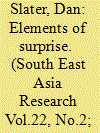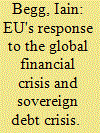| Srl | Item |
| 1 |
ID:
133118


|
|
|
|
|
| Publication |
2014.
|
| Summary/Abstract |
If anything is more surprising than Burma's recent adoption of democratic reforms, it is that military rule lasted so long without such reforms in the first place. This article considers this paradox from both a country-specific and comparative-theoretical perspective, and argues that both perspectives are essential for analysing Burma's uncertain reform process as it unfolds or unravels. It portrays the top-down reform process as one of double-edged détente between the ruling Tatmadaw and its internal rivals as well as its external critics. This détente is inherently fragile because it rests on the current regime's confidence that democratization will produce neither serious instability nor even its own decisive defeat. Events that shake the Tatmadaw's 'victory confidence' and 'stability confidence' should thus pose the greatest risk that reforms will be stalled or reversed.
|
|
|
|
|
|
|
|
|
|
|
|
|
|
|
|
| 2 |
ID:
111025


|
|
|
|
|
| Publication |
2012.
|
| Summary/Abstract |
Since the sovereign crisis erupted in the autumn of 2009 when the true scale of the Greek fiscal deficit was revealed, the European Union (EU), and especially the euro area, has staggered from crisis to crisis. Major initiatives have, however, been taken to improve economic governance and to put in place a more resilient framework for the euro. This article assesses how the EU has responded to the crisis and offers explanations for why the reform process has been slow and indecisive. It shows that potentially enduring solutions are on the table, but that they have been hard to introduce because of differing national perspectives and disagreements about how the burdens of adjustment should be shared. The article concludes by setting out plausible options and explaining what they entail.
|
|
|
|
|
|
|
|
|
|
|
|
|
|
|
|
| 3 |
ID:
126016


|
|
|
|
|
| Publication |
2011.
|
| Summary/Abstract |
18 November was a big day for Burma watchers, at least for those in favour of detente with the regime. On that day, President Barack Obama, apparently deciding to give the Burmese government the benefit of the doubt with regard to its 'reforms' process, called democracy leader Aung San Suu Kyi from Air Force One as he was on his way to Bali, Indonesia, to attend the annual ASEAN Summit. They talked for 20 minutes, with Suu Kyi reportedly inquiring about the president's entire family, even his dog, Bo. Soon after, President Obama announced that he would send his secretary of state, Hilary Clinton to Burma on 1 December, to test whether the validity of the new reforms put in place by the government. It is yet unclear whether Clinton will be able to see the political prisoners still in jail, especially the 2007 'Saffron Revolution' leader U Gambira and Min Ko Naing, the political activist made famous during the 1988 uprisings.
|
|
|
|
|
|
|
|
|
|
|
|
|
|
|
|
| 4 |
ID:
127509


|
|
|
|
|
| Publication |
2014.
|
| Summary/Abstract |
This article examines sketches from the Syrian television show Buq'at Daw' (Spotlight). Once considered indicative of changes many hoped for during the early days of the Bashar al-Asad regime, Buq'at Daw' remained popular through the reform process's failure and the beginning of the recent Syrian uprising. While scholars have cast critical programming as an "airing" of public frustrations permitted by the regime in order to stave off popular protest, this article argues that focusing on government intent robs intellectuals of agency. Instead, this article looks at productions like Buq'at Daw' as part of a continual attempt by drama creators to challenge limits of what is permissible through innuendo, stratagem, and word artistry.
|
|
|
|
|
|
|
|
|
|
|
|
|
|
|
|